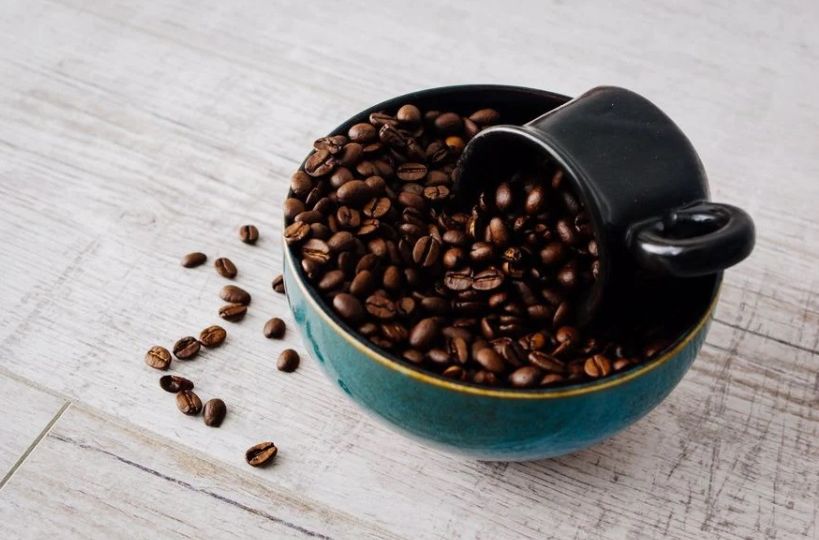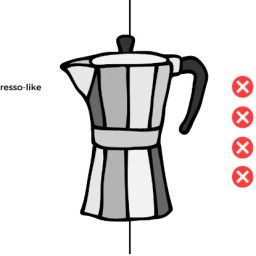
Dark roast coffee, beloved for its bold flavor and enticing aroma, holds a prominent place in the coffee culture. Unlike lighter roasts, which aim to preserve the unique characteristics of the coffee bean, dark roasts undergo a longer roasting process. This not only deepens the color to a rich, dark brown but also enhances the coffee’s natural oils, giving it a distinctive sheen.
The extended exposure to heat transforms the bean’s sugars and acids, creating a robust flavor profile that veers towards smokiness, often with hints of chocolate or caramel. This makes dark roast a popular choice for those who prefer their coffee with a strong, pronounced taste.
Key Reasons Why Dark Roast Coffee May Be Considered Bad
- Higher Levels of Acrylamide: Dark roast coffee has been found to contain higher levels of acrylamide, a chemical that forms during the roasting process. Acrylamide is recognized as a potential carcinogen, which raises concerns about long-term health effects.
- Lower Levels of Caffeine: Contrary to popular belief, dark roast coffee generally has less caffeine than its lighter counterparts. The roasting process reduces caffeine content, meaning it might not satisfy those looking for a strong caffeine kick.
- Increased Acidity: The intense roasting process can lead to higher acidity in dark roast coffee, which might cause digestive discomfort for some people. This includes symptoms like heartburn or stomach irritation, particularly for those with sensitive stomachs.
- Loss of Antioxidants: Coffee is a significant source of antioxidants, but dark roasting reduces levels of chlorogenic acids, the main antioxidants in coffee. This diminishes the health benefits commonly associated with drinking coffee.
- Burnt or Smoky Taste: The flavor of dark roast coffee can be a double-edged sword. The same process that imparts a bold flavor can also lead to a burnt or overly smoky taste, which some might find unpleasant or overpowering.
Health Implications of Dark Roast Coffee
The roasting process of coffee beans is not just about achieving a rich flavor; it also induces significant chemical changes in the beans. These changes can have various impacts on health, which coffee lovers should be aware of, especially those who prefer dark roasts.
Chemical Changes During Roasting
During roasting, coffee beans undergo a transformation as complex chemical reactions occur. One notable change is the formation of acrylamide, a chemical that has drawn concern from health experts due to its potential carcinogenic properties. Acrylamide levels tend to rise as the roasting gets darker. In addition to acrylamide, dark roasting significantly reduces the levels of chlorogenic acids—important antioxidants found in coffee.
These antioxidants are known for their health benefits, including reducing inflammation and combating free radicals. Unfortunately, the longer and hotter roasting process of dark roast coffee diminishes these beneficial compounds.
Potential Health Risks
The health implications of these chemical changes are significant. For instance, the increased acidity in dark roast coffee can lead to digestive issues for some individuals. This heightened acidity may exacerbate conditions like acid reflux, gastroesophageal reflux disease (GERD), and can lead to discomforts such as heartburn and stomach pain.
Moreover, while the reduction in caffeine might be preferable for those looking to lower their caffeine intake, it also means missing out on the potential metabolic benefits that higher levels of caffeine can offer.
Despite these concerns, it’s important to remember that moderate coffee consumption is still considered safe for most people, and it can be part of a healthy diet. However, individuals with certain health conditions or sensitivities might need to pay closer attention to the type of coffee they consume. Opting for a lighter roast might mitigate some of these risks, as lighter roasts retain more chlorogenic acids and have a lower level of acrylamide.
Impact on Coffee Flavor and Quality
The allure of dark roast coffee often lies in its bold, rich flavor and the perceived sophistication of its taste profile. However, the very process that imparts these qualities can also obscure the original, nuanced flavors of the coffee beans, leading to a less diverse flavor profile.
Masking Original Flavors
Dark roasting involves roasting coffee beans at higher temperatures for longer periods compared to lighter roasts. This intense process breaks down more of the beans’ complex sugars and volatile compounds, which are crucial for the unique flavors and aromas inherent to specific coffee origins.
For example, beans from Ethiopia are famed for their floral and fruity notes, and beans from Colombia often carry a mild and nutty flavor. Unfortunately, under the dark roast treatment, these subtle distinctions tend to get overshadowed by overwhelmingly strong roast flavors.
The loss of these delicate flavors is due to the caramelization of sugars and the development of melanoidins, which are compounds that give dark roast coffee its characteristic dark color and bold flavor. While these changes make for a robust cup, they diminish the bean’s original flavor profile, making it difficult for aficionados to appreciate the true essence of the bean’s origin.
Burnt and Smoky Tendencies
Moreover, dark roast coffee often exhibits a burnt or overly smoky taste, which can be off-putting to some drinkers. This is a direct result of the roasting process reaching temperatures where the beans not only crack but start to burn, releasing bitter and carbon-like flavors. These intense, smoky notes can mask any remaining delicate flavors the beans might have retained through roasting.
The challenge with dark roast is striking the right balance between achieving a deep, rich flavor and avoiding the bitterness associated with over-roasting. This balance is hard to achieve, with even skilled roasters sometimes crossing the line into producing beans that taste more like charcoal than coffee. The thin line between a perfect dark roast and a batch of burnt beans highlights the precision required in the roasting process.
Consumer Preferences
Despite these drawbacks, dark roast coffee remains popular for several reasons. Some consumers prefer the bold, straightforward taste, finding it stronger and more invigorating. Others appreciate dark roast’s reduced acidity, which makes the coffee gentler on the stomach. This preference shows that while the complexity of flavor might be reduced, the appeal of a robust, hearty cup of coffee still holds strong allure for many.
Caffeine Content and Its Effects
One common misconception about dark roast coffee is that it packs a heavier caffeine punch due to its robust flavor and darker color. However, the reality is quite the opposite: dark roast coffee generally contains less caffeine than lighter roasts, which might surprise those who rely on coffee for a strong caffeine boost.
Caffeine Reduction in Dark Roast
The process of roasting coffee beans affects their caffeine content. The longer and hotter the beans are roasted, the more caffeine is burned off. Dark roast coffee undergoes a roasting process at higher temperatures and for extended periods, leading to a decrease in caffeine. This is because caffeine, being a volatile compound, degrades under prolonged exposure to heat.
The difference in caffeine content might not be drastically high but can be significant for those who are sensitive to caffeine or who rely on their morning coffee for a quick wake-up. While the exact amount varies, dark roasts typically have slightly less caffeine per bean compared to their lighter counterparts.
Impact on Coffee Drinkers
For coffee enthusiasts who cherish a strong caffeine kick to jumpstart their day, dark roast may not be the ideal choice. The reduced caffeine content means that one might need to consume more coffee to achieve the desired energizing effects, which could inadvertently increase the intake of other compounds in coffee, such as oils and acids.
Conversely, for those looking to decrease their caffeine consumption without cutting coffee entirely, dark roast offers a viable solution. It allows coffee drinkers to enjoy the beverage with a reduced risk of the jittery side effects associated with high caffeine levels, such as anxiety, restlessness, and disrupted sleep patterns.
Balancing Flavor and Caffeine Needs
Choosing the right roast can be a balancing act between flavor preferences and caffeine needs. Dark roast fans might appreciate the bold, smoky flavor profiles, but they should be aware of the lower caffeine levels. In contrast, those who prefer a more potent caffeine effect might opt for lighter roasts, which retain more of the bean’s original caffeine content.
For those caught between flavor and caffeine content, exploring medium roasts can provide a middle ground, offering a decent caffeine kick while still delivering rich flavor.
FAQs
Does dark roast coffee have more antioxidants than light roast?
No, dark roast coffee generally has fewer antioxidants than light roast. The roasting process reduces levels of chlorogenic acids, antioxidants that are more abundant in lighter roasts.
Can dark roast coffee help with weight loss?
Yes, some studies suggest that dark roast coffee might help with weight loss due to its ability to increase the activity of enzymes that break down fat cells. However, these effects are not exclusive to dark roast and are influenced by overall diet and lifestyle.
How does the taste of dark roast compare to other roasts?
Dark roast coffee has a bold, robust flavor with smoky or burnt notes, which is significantly different from the brighter, acidic profile of light roasts or the balanced flavors of medium roasts. This strong flavor can mask the bean’s original characteristics.
Final Thoughts
Dark roast coffee presents a complex balance of advantages and disadvantages. While it is favored for its bold flavor and lower acidity, it contains less caffeine and fewer antioxidants compared to lighter roasts. The intense flavor, often described as smoky or even burnt, is a distinct characteristic that might not appeal to everyone.
Despite these downsides, dark roast coffee remains a popular choice for many coffee lovers. Its robust profile pairs well with creamy or sweet additives, making it ideal for various coffee beverages. For those with a preference for a gentler cup in terms of caffeine impact, or who enjoy a strong, pronounced taste, dark roast can be an excellent choice.









